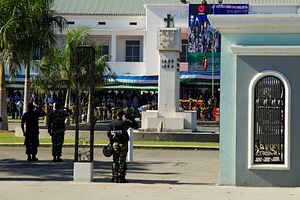East Timor’s new prime minister, Dr Rui Maria de Araújo, appealed for unity as a way to build a more inclusive and tolerant society. Araújo became the head of the Sixth Constitutional Government after former Prime Minister Xanana Gusmão resigned last month.
While taking his oath on February 16, Araújo presented some of his plans for East Timor. First, he vowed to uphold “the essence of democratic values in Timor-Leste: peace, reconciliation, solidarity, pluralism, tolerance and dialogue.” He also spoke about boosting the country’s security. “We will give more attention to the patrol and vigilance of our maritime coast to protect our coral reefs and fish resources from illegal incursions in our sea.”
He praised the leadership of Gusmão, whom he appointed minister for Planning and Strategic Investment. He reminded the public that it was during the term of Gusmão when East Timor became “the first country in the Asia-Pacific region and the third in the entire world to be granted compliance status with the Extractive Industries Transparency Initiative.” Araújo said he will continue to implement the Strategic Plan drafted by his predecessor and that the new government will focus “on better service delivery and on the quality of works, in a manner that is efficient, effective and accountable.”
But Araújo also indirectly mentioned some of the problems left behind by the previous government.
“One of our current difficulties is the lack of data and reliable indicators on the situation of the country. The last official data we have on poverty dates back to 2009 and told us that almost half the population lived below the national poverty line,” he said. He added that “the benefits of economic growth have not reached everyone.”
He also acknowledged the prevalence of corruption and inefficiency in the government. “Our priority is to fight the culture of bureaucratization in public administration, which has become a giant with feet of clay.”
According to Araújo, one of the first tasks of the new government will be to submit declarations of assets with the court and the Anti-Corruption Commission.
“I intend to personally deliver these on behalf of all members of government. When I leave this office, I will lodge another declaration of assets that I promise will show I have not profited from my position. And when I leave this office, I want Timor-Leste to be recognized as a world leader in open, transparent, accountable and ethical government,” he said in a speech delivered before the Anti-Corruption Commission.
Araújo is also expected to implement programs that will empower women. When he was adviser to the Ministry of Finance, he worked to identify women as potential managers and top leaders in the agency. Today, according to Araújo, women represent 32 percent of the leadership team in the office.
But can Araújo deliver on his commitments? Gusmão is confident that his younger successor can lead the country’s transition. Araújo is an opposition member; nevertheless, he was still endorsed by Gusmão because of his proven capabilities.
“His deep knowledge of the financial system, a wide experience which can not be underestimated, on the model applied to capacitate technical staff, implemented during his years in the ministry [Finance] as an adviser, and his integrity, as a person, these are the three relevant elements which are the fundamental reason behind the proposal of his name,” Gusmão wrote in his nomination for Araújo.
Araújo has much reforming to do if he wants to achieve his goals for East Timor. He is right to call for unity but it should not mean being less critical of the policies and programs of the previous government.

































